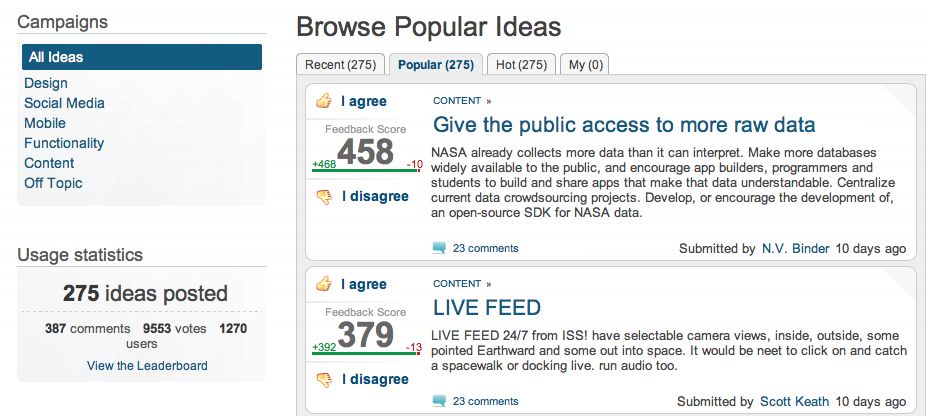 NASA.gov is looking for change and is turning to its users for input. NASA has opened up a forum on the platform Ideascale. An innovation platform, for collaboration, Ideascale can help bring out the best ideas from your customers and stakeholders by giving them a medium to share, vote and discuss feedback.
NASA.gov is looking for change and is turning to its users for input. NASA has opened up a forum on the platform Ideascale. An innovation platform, for collaboration, Ideascale can help bring out the best ideas from your customers and stakeholders by giving them a medium to share, vote and discuss feedback.
Corporations are feeling the new wave of business innovation that can arise from open innovation and government is not far behind. NASA wants to take advantage of the huge public interest in programs to re-design its website so citizens will stay engaged. A positive feedback loop like this can help NASA retain its following, engage kids, improve educational offerings and more. The request for suggestions has already created a buzz with 1270 registered users, 387 comments, 275 ideas since launching about 10 days ago. More than 9500 votes have been cast for the ideas submitted. The campaign page states,
We’re starting on the next go-round of what NASA.gov looks like and want to know what you think.
The digital universe has changed radically since we overhauled www.NASA.gov in 2007. Everyone’s use of social media and smartphones has exploded. Visits to NASA’s web sites dropped for a couple of years, then set records in 2011 and this year.
How are you making sense of all this? How do you think we here can apply what you’ve learned? Do you like something you’ve seen? Is something missing? How do you interact with NASA online? Where else do you get your NASA news from?
We’ve opened this forum to take your feedback. You can offer ideas of your own or comment and vote on others’ suggestions. The forum will be open for new ideas until Dec. 19. We’ll consider all the suggestions and do some prototyping, then see what you think.
Some of the interesting ideas include suggestions for – a live camera feed from the International space station, setting up a clock to show NASA activities and events and setting up NASA university with lessons on basic astronomy and climate science. The most popular suggestion is for opening up more raw data to the public.
What do you think about NASA’s efforts?




0 Comments